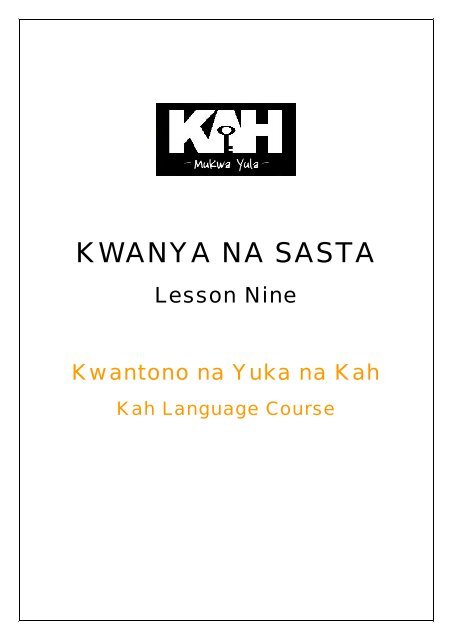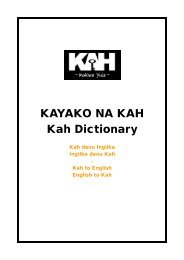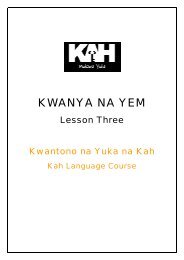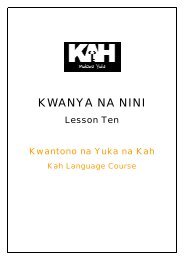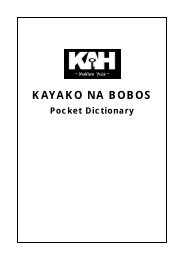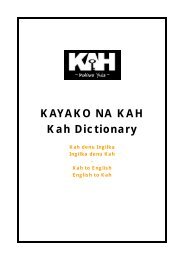Create successful ePaper yourself
Turn your PDF publications into a flip-book with our unique Google optimized e-Paper software.
<strong>KWANYA</strong> <strong>NA</strong> <strong>SASTA</strong><br />
Lesson Nine<br />
Kwantono na Yuka na <strong>Kah</strong><br />
<strong>Kah</strong> Language Course
Lesson 9<br />
Kes yu Yil - The X that Y-d<br />
This lesson is to tackle one of the most complicated features of <strong>Kah</strong>: relative<br />
clauses. To give you an idea of what relative clauses are, here are some<br />
examples from English:<br />
the boy that won<br />
the man who fell<br />
the house which burnt down<br />
<strong>Kah</strong> does not use words like that, who or which, it does not have relative markers.<br />
Instead, <strong>Kah</strong> resorts to double marking of the word that is the head of the relative<br />
clause. Double marking means the word is referred to twice, once as a head, and<br />
once with a personal pronoun. In practice this looks like:<br />
simbu yu fiti<br />
BOY HE WIN<br />
the boy that won<br />
The head of the phrase is simbu. A phrase like simbu fiti would have meant<br />
simply "the boy won". The fact the head is "repeated" by adding a personal<br />
pronoun yu "he" makes the relative aspect come out. Compare:<br />
simbu gevu<br />
BOY RUN<br />
the boy ran<br />
simbu kiza<br />
BOY EAT<br />
the boy ate<br />
nia bai<br />
CAR BROKEN<br />
the car is broken<br />
yudo opi<br />
HOUSE BURNT<br />
the burnt house<br />
simbu yu gevu<br />
BOY HE RUN<br />
the boy that ran<br />
simbu yu kiza<br />
BOY HE EAT<br />
the boy who ate<br />
nia ya bai<br />
THE CAR IT BROKEN<br />
the boy that is broken<br />
yudo ya opi<br />
HOUSE IT BURNT<br />
the house which is burnt
9.1 Kwau yu kiza seki<br />
The following story makes extensive use of double marking/relative clauses:<br />
Kwikuta tauku wi, Uma Kwau sencho reo ya yunkule janjang wi. Ya rosa<br />
kwambe ai lam wi.<br />
Uma nura tila reo ai jovan ya eno Uba Kwau<br />
nong ke weyun reo janjang.<br />
Ze maro kwa reo tombai ai bene yu pesan<br />
wi bochu. Yu kwauka: "Mama!" ai nonoivu<br />
denu Uba ai Uma Kwau.<br />
"Hayu uwau?" donka Uba Kwau. "Bene wau<br />
nong na wa. Kwau nong janja pesan ai nong<br />
le vuvu pan. Je nong tengi sofi ewe!"<br />
"Abal lo!" Uma Kwau ka ai gevu denu aso ai nuku sofi. "Mama!" bene<br />
pesan kwauka ai gevu denu aso mau.<br />
Pya bo aso ai geta vubon. "Weyun ha?" Uba Kwau kwauka wonka. "Uye<br />
nong bene na wa! Uye yoyong bene!"<br />
Bene pesan tinu. Randun kenke nai na Uma Kwau ai vunu mau kum yu<br />
vu aso. Tai jede ho bene yu pesan nong kwau, chumun kwau yu kiza<br />
seki nong laila.<br />
Yunkule yompo moreo pembenga.<br />
kwikuta - once, once upon a time<br />
tauku - ago<br />
sencho - to give birth to<br />
janjang - weird, unusual<br />
rosa - round<br />
tora - to sit down<br />
jovan - to hide
tombai - to break, get broken<br />
bene - chick, duckling<br />
bochu - to hatch<br />
nonoivu - to waddle<br />
donka - to yell, scream, exclaim<br />
janja - usual, usually<br />
sofi - to swim<br />
ewe - even<br />
abal - nonsense<br />
nuku - to start, begin<br />
pya - to jump, hop<br />
geta - instantly, immediately, right away<br />
vuboa - to submerge, sink<br />
wonka - angry<br />
tinu - to ascend, come up<br />
randun - to bite<br />
ken - neck<br />
jede - to realize<br />
yunkule - to seem<br />
yompo - instead<br />
moreo - to hatch<br />
pembenga - crocodile<br />
In this text the word ya was used in order to double-mark a relative clauses<br />
having a inanimate noun as a head:<br />
reo ya yunkule janjang wi<br />
EGG IT LOOK UNUSUAL VERY<br />
an egg which looked very unusual<br />
More examples of the use of ya as a double-marker are:<br />
aso ya sonu<br />
WATER IT RUN<br />
running water<br />
dinya ya bai<br />
LAMP IT BROKEN<br />
the broken lamp<br />
Plural nouns are double-marked by the pronouns yunyo (animate) and yanyo<br />
(inanimate):<br />
simbu yunyo senji<br />
BOY THEY DANCE<br />
the boys that danced<br />
ape yanyo bon<br />
TREE THEY FALL<br />
the trees that fell
9.2 Ala al dochu lai<br />
Kwau yu kiza seki la yoyoi. "Mama nong le," donka. "Baba nong le. Yoi,<br />
vanyo yoyong le. Vado nong le chumun nong jo ala wa dochu lai..."<br />
Dundu nechi na uma ai yoyoi ai sofi nong la boyun ala yu denu lai.<br />
Bua Sinsipya wehim bene minyun la yoyoi ai haka yu: "Tente wa tengi<br />
leo. Jo ala li chu lai ha?" "Eo reshi," bene waika. Jewai reo wa bochu lai<br />
nen wi. Ya rosa ai lam."<br />
"Nen, nen," Sinsipya jeje. "Echu jo ata bochu tai ha?" "Eo, ninku wau wa<br />
nuchi reo ye. Wa lara lai maro kwa deche ata wa bochu tai,"<br />
"Ai nong yunkule fanyo ha?" Sinsipya haka. "Yoyong," bene kwauka.<br />
"Echu tim li ho tikim," Bua Sinsipya jesa. "Kwiku koyun kaiko ya bole<br />
atoka shai. Tontoye, tim kele tikim yin,"<br />
"Pai wi lo," bene minyun waika la nyeka ai geza ken na Sinsipya kum yu<br />
vu aso eno kiza yu mau.<br />
Yunkule yu rata pembenga.<br />
dochu - to belong, belong to<br />
dundu - to chew, chew on<br />
nechi - wing<br />
boyun - to notice, pay attention to<br />
sinsipya - dik-dik<br />
haka - to ask<br />
leo - to help<br />
waika - to answer<br />
jewai - to remember, recall<br />
donka - to yell, scream<br />
jeje - to ponder<br />
deche - until<br />
tikim – swan
jesa - to think, feel, be of the opinion that<br />
kwiku - once, once before<br />
koyun - to read<br />
kaiko - book<br />
bole - to contain<br />
atoka - story<br />
yin - other<br />
nyeka - happy, happily<br />
geza - to grab<br />
In this text relative clauses referring to a location came up:<br />
ala wa dochu lai<br />
PLACE I BELONG THERE<br />
the place I belong<br />
(literally: "the place I belong there")<br />
ala yu denu lai<br />
PLACE HE GO THERE<br />
the place he was going<br />
(literally: "the place he goes there")<br />
ala li chu lai<br />
PLACE YOU FROM THERE<br />
the place you come from<br />
(literally: "the place you come from there")<br />
The head of these relative clauses is the word ala "place". It is marked again by<br />
the word lai "there". In another relative clause referring to a location the word reo<br />
"egg" was double-marked by lai as well:<br />
reo wa bochu lai<br />
EGG I HATCH THERE<br />
the egg I came from<br />
(literally: "the egg I was hatched out of there")<br />
Similarly the following locations are double-marked by lai:<br />
kwando wa dedenu lai<br />
SCHOOL I ATTEND THERE<br />
the school I attend<br />
(literally: "the school I attend there")<br />
yudo li dora lai<br />
HOUSE YOU LIVE THERE<br />
the house you live<br />
(literally: "the house you live there")
dola ya to lai<br />
CITY IT HAPPEN THERE<br />
the city where it happened<br />
(literally: "the city it happened there")<br />
For words referring to time, the double-marking is done with the word tai "then":<br />
ata wa bochu tai<br />
TIME I HATCH THEN<br />
when I hatched<br />
(literally: "the time I hatched then")<br />
tiro yu senchu tai<br />
YEAR HE BE BORN THEN<br />
the year he was born<br />
(literally: "the year I was born then")<br />
sinta yu jede tai<br />
MOMENT SHE REALIZE THEN<br />
the moment she realized<br />
(literally: "the moment she realized then")
9.3 Amun chumunye<br />
Naim ai mambau la dora kwala bo yudo. Toyo naim ke jandoren kwasi.<br />
Ai mambau ke woika, yoika ai wua sisi, chumun tatang ke oyosa.<br />
Naim kan lon, sekan ai geku. Anin yo jaren yudo. La kwa, mambau ka yu<br />
en shim zubea. Eta naim oyo munyun mambau bea be yulo shim ya,<br />
esto mambau che naim la titi.<br />
"Yai!" naim silka ai donka: "Hamun che wa ha?" "Bea yin rata nong shim.<br />
Amun chumunye!" mambau donka naim yu yoyoi.<br />
Naim shim ai sekan nyom bea yo. Eta oyo, mambau pya denu yu, za<br />
kenke ai janonoi. "Hamun?" naim yoika. "Nong yingo zonya, amun<br />
chumunye!" mambau waika naim.<br />
Naim gevu denu zombea, yingo zongo na zonya na mambau, nyom<br />
shenum yo ai shim ango yo na mambau mau. Esto mambau wai che yu<br />
la titi don ai wua: "Nong kwi janzu, amun chumunye!"<br />
Naim nong jo ashi tengi janyosa mambau shai, esto gevu chipola, paza<br />
seki shu, peki henchu ai loiki mweti wi. Denu vado ai kemun lon en jam<br />
kito shu. Zeye, za chuntal ai zipe ai shinas ai shim yudo wai, nyom ai<br />
moham doya yo deche ayo dingu. Tai pau mambau kito ai tara anenka.<br />
Mambau kiza chunka kiski, loloi yol yo kwa ze kwa, weyun yudo kwambe<br />
ai nyeki: "De lo, ustu sinsi!"<br />
Eta naim pepye faunu, mambau cheche yu la titi layo ai wua: "Hamun<br />
nong jango tivan?!"<br />
atoka - story<br />
kwala - together<br />
jandoren - to tend the house, do the housekeeping<br />
woika - to complain<br />
yoika - to lament<br />
wua - to howl
tatang - never<br />
oyosa - satisfied, content<br />
kan - to work<br />
lon - intense, hard<br />
sekan - to work hard, labour<br />
geku - to hurry<br />
jaren - to tidy up<br />
la kwa - first, in the first place, firstly<br />
shim - to clean<br />
zubea - kitchen<br />
eta - when<br />
oyo - ready, done<br />
munyun - to show<br />
bea - room, chamber<br />
che - to hit<br />
silka - to shriek<br />
janonoi - to rock, shake back and forth<br />
yin - to change, change clothes<br />
amun - reason<br />
chumunye - because of that<br />
amun chumunye - that's why<br />
nyom - to rub<br />
shenum - window<br />
dingu - to glitter, sparkle, shine<br />
yingo - to change, change clothes<br />
zongo - sheet<br />
ango - cloth<br />
zonya - bed<br />
zombea - bedroom<br />
don - hard, forceful<br />
ashi - way, manner<br />
janyosa - to satisfy<br />
pya - to jump<br />
henchu - fresh<br />
mweti - delicate<br />
kito - meal<br />
zeye - afterwards<br />
chuntal - to lie, lie down<br />
zipe - brush<br />
shinas - soap<br />
moham - polish<br />
doya - (piece of) furniture<br />
deche - until<br />
tara - to wait, wait for<br />
anenka - compliment<br />
chunka - to smack<br />
kiski - lips<br />
loloi - to lick
kwambe - whole, entire, complete<br />
nyeki - to smile<br />
ustu - friend<br />
pepye - to tremble<br />
faunu - toapproach, come close<br />
cheche - to beat, hit repeatedly<br />
layo - everywhere<br />
jango - to put on, dress<br />
tivan - hat<br />
The phrase amun chumunye "that's why" is a relative clause of its own. The<br />
word chumunye "because of that" double-marks the word amun "reason": "The<br />
reason is because of that". Compare:<br />
nong jo amun wa jam chumunye<br />
NOT KNOW REASON I DO BECAUSE OF THAT<br />
I don't know why I did it<br />
(literally: "I don't know the reason I did it because of that")<br />
ka wa amun li jam chumunye<br />
SAY I REASON YOU DO BECAUSE OF THAT<br />
tell me why you did it<br />
(literally: "Tell me the reason you did it because of that")<br />
aye amun mambau che naim chumunye<br />
THAT REASON WOLF HIT RABBIT BECAUSE OF THAT<br />
that's why the wolf hit the rabbit<br />
(literally: "That is the reason the wolf hit the rabbit because of that")<br />
tengi ka wa amun na tusung en jempeza lau chumunye ha?<br />
CAN SAY I REASON OF BE PROHIBITED THAT SMOKE HE BECAUSE OF THAT<br />
Q<br />
can you tell me why it is prohibited to smoke here?<br />
(literally: "Can you tell me the reason of being prohibited to smoke<br />
here because of that?")<br />
Furthermore, we saw a relative construction which is translated with gerunds in<br />
English:<br />
mambau donka naim yu yoyoi<br />
WOLF YELL RABBIT HE CRY<br />
the wolf yelled at the crying rabbit<br />
(literally: "the wolf yelled at the rabbit he cry")<br />
<strong>Kah</strong> uses such constructions quite a lot:<br />
une yu la jika<br />
BIRD IT BE AT SING<br />
the singing bird, the bird that is singing
weyun une yu la jika<br />
SAW BIRD IT BE AT SINGING<br />
I saw the singing bird, I saw the bird that was singing<br />
wamai kenyo yunyo la fiti<br />
CHEER TEAM THEY BE AT WIN<br />
they cheered for the winning team, the team that was winning<br />
Also, the story contained a relative clause of manner:<br />
naim nong jo ashi tengi janyosa mambau shai<br />
RABBIT NOT KNOW MANNER CAN SATISFY WOLF LIKE THAT<br />
the rabbit did not know how to satisfy the wolf<br />
(literally: "the rabbit did not know the manner he could satisfy the<br />
wolf like that")<br />
The word shai "like that" double marks the word ashi "manner". Compare:<br />
awau nong ashi eno jam shai<br />
THIS NOT MANNER TO DO LIKE THAT<br />
this is not the way to do it<br />
(literally: "this is not the manner to do it like that")<br />
om yun ashi jam shai<br />
OPT LOOK WAY DO LIKE THAT<br />
let's see how to do this<br />
(literally: "let's look at the manner to do it like that")<br />
ashi eno zia yunga shai<br />
MANNER TO SERVE HUMAN LIKE THAT<br />
how to serve man<br />
(literally: "the manner in order to serve human like that")<br />
9.4 Yuka be li la kwan ya<br />
The text in the previous paragraph contained a phrase reading:<br />
munyun mambau bea be yulo shim ya<br />
SHOW WOLF ROOM TOP HIMSELF CLEAN IT<br />
he showed the wolf the room he cleaned<br />
This phrase is interesting because of two things. First of all, the pronoun yulo<br />
"himself" is used instead of yu "he":<br />
munyun mambau bea be yulo shim ya<br />
SHOW WOLF ROOM TOP HIMSELF CLEAN IT<br />
he showed the wolf the room he cleaned<br />
If he would have said yu "he", the translation would be identical in the English<br />
translation:
munyun mambau bea be yu shim ya<br />
SHOW WOLF ROOM TOP HE CLEAN IT<br />
he showed the wolf the room he cleaned<br />
The difference would be in the interpretation of the English word "he". When the<br />
<strong>Kah</strong> sentence uses yulo, the word refers back to the speaker, the rabbit:<br />
munyun mambau bea be yulo shim ya<br />
SHOW WOLF ROOM TOP HIMSELF CLEAN IT<br />
he showed the wolf the room he (i.e. the rabbit) cleaned<br />
When the <strong>Kah</strong> sentence uses yu, however, the word refers to a third person:<br />
munyun mambau bea be yu shim ya<br />
SHOW WOLF ROOM TOP HE CLEAN IT<br />
he showed the wolf the room he (i.e. someone else) cleaned.<br />
Also compare:<br />
simwana ka yulo kwasi<br />
GIRL SAY HERSELF ALONE<br />
the girl said she (.i.e. the girl herself) was alone<br />
simwana ka yu kwasi<br />
GIRL SAY SHE ALONE<br />
the girl said she (i.e. someone else) was alone<br />
simwana ka ustu kwasi<br />
GIRL SAY FRIEND ALONE<br />
the girl said her friend was alone<br />
The second remarkable thing about this phrase is the use of the topic marker be.<br />
The head of the relative clause, the word bea, is followed by it:<br />
bea be yulo shim ya<br />
ROOM TOP HIMSELF CLEAN IT<br />
the room he cleaned<br />
The head bea is marked by the marker be since the object of the verb shim "to<br />
clean" is placed in the beginning of the phrase just like the examples we<br />
encountered earlier in Lesson 8:<br />
Merih Jan nenju - John loves Mary / Mary loves John<br />
Merih be Jan nenju - John loves Mary / *Mary loves John<br />
hayu weyun - who did you see? / who saw it?<br />
hayu be weyun? - who did you see? / *who saw it?<br />
haya mun? - what did you cause? / what caused it?<br />
haya be mun? - what did you cause? / *what caused it?
Now compare the following phrases:<br />
bea be yu shim<br />
ROOM TOP HE CLEAN<br />
it was the room he cleaned<br />
une be yu weyun<br />
BIRD TOP HE SEE<br />
it was a bird he saw<br />
nia be yu paza<br />
CAR TOP HE BUY<br />
it was a car he bought<br />
vs.<br />
bea be yu shim ya<br />
ROOM TOP HE CLEAN IT<br />
the room he cleaned<br />
une be yu weyun yu<br />
BIRD TOP HE SEE IT<br />
the bird he saw<br />
nia be yu paza ya<br />
CAR TOP HE BUY IT<br />
the car he bought<br />
And the difference between the following phrases:<br />
bau yu randun meo<br />
DOG HE BITE CAT<br />
the dog that bit the cat<br />
bau be meo randun yu<br />
DOG TOP CAT BITE IT<br />
the dog the cat bit<br />
The following conversation contains a lot of relative phrases and the be marker:<br />
Dainah: -Mai baninta.<br />
Dana: -Good afternoon<br />
Umumpo: -Mai wai.<br />
Vendor: -Hello.<br />
Dainah: -Soi waipau nia be wa lapau ya ninku wau.<br />
Dana: -I'd like to return the car I rented this morning.<br />
Umumpo: -Nong tento en lapau anin sun ha?<br />
Vendor: -Weren't you supposed to rent it for two days?<br />
Dainah: -Je en nong.<br />
Dana: -I think not.<br />
Umumpo: -Ha ho? Nen, hala nia be li lapau ha?<br />
Vendor: -Really? Well, where is the car that you rented?.<br />
Dainah: -Lau chachau.<br />
Dana: -Right here.
Umumpo: -A, aye nong nia be wa jalapau ya li...<br />
Vendor: -Er, that is not the car I rented to you<br />
Dainah: -Hashi jo?<br />
Dana: -How do you know that?<br />
Umumpo: -Nia be jalapau li ya le ada pan ai kudinya. Mau, ya lam, nong<br />
rai ai pesan. Aku nong bai shi ya na nia ye.<br />
Vendor: -the car I rented you had four wheels and headlights. Also, it<br />
was white, not brown and green. The front was not broken like the one<br />
on that car.<br />
Dainah: -Reje ha?<br />
Dana: -Are you sure?<br />
Umumpo: -Reje wi. Haya to tos nia ye?<br />
Vendor: -Very sure. What happened to that car?<br />
Dainah: -Tim wa chenoi chu simbu yu geze sankane yu weka Faransaka<br />
la nuno ai bunu ape.<br />
Dana: -I had to steer clear of a boy chasing a parrot speaking French on<br />
the road and crashed into a tree.<br />
Umumpo: -Wu tomwong tos sankane ye...<br />
Vendor: -I'm getting so fed up with that parrot...<br />
...<br />
waipau - to return, give back<br />
lapau - to rent<br />
tento - to be supposed to<br />
chachau - exactly, precisely, right<br />
jalapau - to rent to<br />
ada - wheel<br />
kudinya - headlights<br />
bai - to be broken, not functioning<br />
reje - to be convince, sure<br />
chenoi - to steer clear of, change direction suddently<br />
geze - to chase<br />
bunu - to crash, crash into<br />
tomwong - to get angry, fed up with<br />
I realize these relative clauses are tricky stuff. Therefore a large portion of the<br />
exercises is suppered up by recognizing, producing and repeating (and repeating)<br />
relative clauses:
1) Please identify the head of the relative clause in the following sentences in the same manner<br />
as the examples:<br />
simwana yu jika<br />
ata ya to tai<br />
nia ya bai<br />
simwana yu jika<br />
ata ya to tai<br />
nia ya bai<br />
1. Simwana yu nyeki<br />
2. Dinya ya bai<br />
3. Win yu gevu<br />
4. Rio yu bochu tai<br />
5. Tiso be al kuka<br />
6. Amun wa jam chumunye<br />
7. Podola be al jampi ya<br />
8. Bau yunyo jaru<br />
9. Bau yu jandun meo<br />
10. Bau yu kiza seki yo<br />
11. Podola wa paza binki lai<br />
12. Ashi yunyo jam shai.<br />
2) Please identify the double marker in the following sentences:<br />
1. Simwana yu nyeki<br />
2. Dinya ya bai<br />
3. Win yu gevu<br />
4. Rio yu bochu tai<br />
5. Tiso be al kuka<br />
6. Amun wa jam chumunye<br />
7. Podola be al jampi ya<br />
8. Bau yunyo jaru<br />
9. Bau yu jandun meo<br />
10. Bau yu kiza seki yo<br />
11. Podola wa paza binki lai<br />
12. Ashi yunyo jam shai.
3) Please make relative clauses of the following phrases in the same<br />
manner as the examples:<br />
simwana jika<br />
nia bai<br />
simwana yu jika<br />
nia ya bai<br />
1. Yudo lam<br />
2. Buyu gevu<br />
3. Ben jafi<br />
4. Naini chu<br />
5. Seki mwa<br />
6. Ben yem jafi<br />
7. Simbu yo jam<br />
8. Ape wen yem boa<br />
9. Ape boa<br />
10. Ben gevu ge tio<br />
4) Please translate into English:<br />
1. Bau yu randun meo.<br />
2. Bau yu randun meo yu kiza seki yo.<br />
3. Bau yu randun meo yu kiza seki yo ya osauzu.<br />
4. Apa be wa dadau ya.<br />
5. Podo uba paza yu fia lai.<br />
6. Podo be al mompi ya.<br />
7. Uba paza yu fia la podo be al mompi ya ninye.<br />
8. Pesanyo be wa paza yanyo.<br />
9. Simwana yu kiza shuki yo.<br />
10. Simwana yu kiza shuki yo be umukwan wonka.<br />
11. Bibi na simwana yi kiza shuki yo yai.<br />
12. Nong jo ata simwana kiza shuki yo tai.<br />
13. Nong jo amun simwana kiza shuki yo chumunye.<br />
14. Nong jo amun nia bai chumunye.<br />
15. Nong jo amun win ye gevu chumunye.<br />
16. Nong jo amun win be wa weyun yu gevu chumunye.<br />
17. Nong jo ala simwana kiza shuki yo lai.<br />
18. Simwana sisi jo ata yulo kiza ayo tai.<br />
19. Jo amun simwana kiza shuki yo tai chumunye ha?<br />
20. Lau ala yu kiza shuki yo lai.
5) Please translate into <strong>Kah</strong>:<br />
1. It's my tummy that is hurting.<br />
2. It's the cat that ate all the meat that I saw.<br />
3. Is that really the way to translate this?<br />
4. Where is the place that it happened?<br />
5. Can you please tell me where I can buy some bread.<br />
6. Is it known why the sun keeps shining?<br />
7. Do they know when the mall was set fire to?<br />
8. It was in October when it started to snow.<br />
9. The month it started snowing was October.<br />
10. I don't know how and I don't know when but I will kill you.<br />
11. I really like the nuts you bought.<br />
12. I don't want the nuts you stuffed up your nose.
Answers<br />
1)<br />
1. Simwana yu nyeki<br />
2. Dinya ya bai<br />
3. Win yu gevu<br />
4. Rio yu senchu tai<br />
5. Tiso be al kuka ya<br />
6. Amun wa jam chumunye<br />
7. Podola be al jampi ya<br />
8. Bau yunyo jaru<br />
9. Bau yu jandun meo<br />
10. Bau yu kiza seki yo<br />
11. Podola wa paza binki lai<br />
12. Ashi yunyo jam shai<br />
2)<br />
1. Simwana yu nyeki<br />
2. Dinya ya bai<br />
3. Win yu gevu<br />
4. Rio yu senchu tai<br />
5. Tiso be al kuka ya<br />
6. Amun wa jam chumunye<br />
7. Podola be al jampi ya<br />
8. Bau yunyo jaru<br />
9. Bau yu jandun meo<br />
10. Bau yu kiza seki yo<br />
11. Podola wa paza binki lai<br />
12. Ashi yunyo jam shai<br />
3)<br />
1. Yudo ya lam<br />
2. Buyu yu gevu<br />
3. Ben yu jafi<br />
4. Naini ya chu ku tio<br />
5. Seki ya mwa<br />
6. Ben yem yunyo jafi<br />
7. Simbu yo yunyo jam<br />
8. Ape wen yem yanyo bon<br />
9. Ape ya bon<br />
10. Ben yu gevu ge tio
4)<br />
1. The bog that bit the cat.<br />
2. The dog that bit the cat that ate all the meat.<br />
3. The dog that bit the cat that ate all the meat that was fried.<br />
4. The money that I counted.<br />
5. The shop father bought me a toy.<br />
6. The shop they set fire to<br />
7. Father bought me a toy in the shop they set fire to yesterday.<br />
8. The vegetables I bought.<br />
9. The girl that ate all the candy<br />
10. It's the girl that ate the candy the teacher is angry with.<br />
11. The tummy of the girl who ate all the candy is aching.<br />
12. I don't know when the girl ate all the candy.<br />
13. I don't know why the girl ate all the candy.<br />
14. I don't know why the car is broken.<br />
15. I don't know why the horse was running.<br />
16. I don't know why the horse I saw was running.<br />
17. I don't know where the girl ate all the candy.<br />
18. Only the girl knows when she ate it all.<br />
19. Do you know why the girl ate all the candy then?<br />
20. Here is the place the girl ate it all.<br />
5)<br />
1. Bibi lo yai.<br />
2. Meo be weyun yu lo kiza seki yo.<br />
3. Aye ho ashi en yinka awau shai ha?<br />
4. Hala ala ya to lai?<br />
5. Soi ka wa podo tengi paza binki si lai.<br />
6. Al jo amun anin lara dindi chumunye ha?<br />
7. Al jo ata al mompi podola tai ha?<br />
8. Ninimaro lo mwere nuku de.<br />
9. Maro mwere nuku de tai Ninimaro.<br />
10. Nong jo ashi shai ai ata tai esto denu jamia li.<br />
11. Ho nenju peo be li paza yanyo.<br />
12. Nong keju peo be li pombo fuku yanyo.


